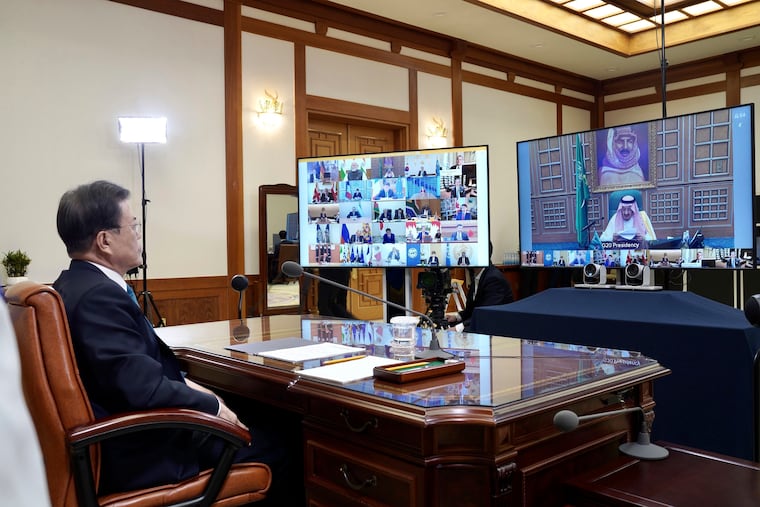Virtual Group of 20 summit opens in Saudi Arabia with pandemic casting economic shadows
Hosted this year by Saudi Arabia, the summit of the world's leading economies has set a sobering list of priorities - the COVID-19 pandemic, global economic crises, climate change - to address.

BEIRUT - The annual gathering of the Group of 20 nations began Saturday like much else in 2020: with the click of a link online.
Hosted this year by Saudi Arabia, the summit of the world's leading economies has set a sobering list of priorities - the covid-19 pandemic, global economic crises, climate change - to address over just two half days of virtual meetings.
The gathering brought backlash from Saudi and international human rights groups - as well as some U.S. and European lawmakers - calling on world leaders to boycott or downgrade their representation over the kingdom's abuses, including jailings of women activists and the killing of Washington Post contributor Jamal Khashoggi at the Saudi Consulate in Istanbul in 2018.
For President Donald Trump, the meetings marked another closing lap on the world stage before handing power to the Biden administration in January.
In his opening remarks, Saudi Arabia's King Salman spoke to a screen of international leaders, including Trump, and highlighted the economic support G-20 members had contributed to combating the coronavirus pandemic and economic fallout.
"In the near future we must address the vulnerabilities exposed by covid-19 by working to protect lives and livelihoods," he said.
To the king's right was Crown Prince Mohammad Bin Salman, the kingdom's de facto ruler, who has sought to reform Saudi's economy and society alongside a years-long crackdown on dissent that's brought him increased scrutiny and criticism.
Saudi Arabia had hoped for an in-person Riyadh summit, but in September announced it would be held virtually because of the coronavirus.
It was initially unclear if Trump would attend, though on Friday he announced he would.
In a statement Friday, European Commission President Ursula von der Leyen said she planned to push members to continue to provide pandemic-related economic support until recovery from covid-19 is certain.
She also expressed hope that America's "new President-elect" Joe Biden will "increase multilateral cooperation" in areas like health and climate change, noting that until now "the United States has resisted engaging" in a rebuke of Trump's isolationist policies.
Expectations remain low that the two-day summit will produce significant results in its toned-down setting. Members are expected to finalize a framework for providing poor nations debt-relief, alongside continuing discussions for financing covid-19 vaccine collaborations.
Saudi Arabia, however, did received a prominent show of support from an unlikely place: Turkey, which has had strained relations since Saudi agents killed Khashoggi.
On Friday, Turkish President Recep Tayyip Erdogan and King Salman of Saudi Arabia spoke by telephone, according to statements from both leaders.
They “agreed on keeping channels of dialogue open in order for the bilateral relations to be enhanced and for issues to be settled,” according to a Turkish readout of the call. Erdogan was scheduled to speak at the summit on Saturday.